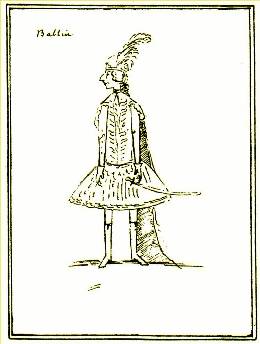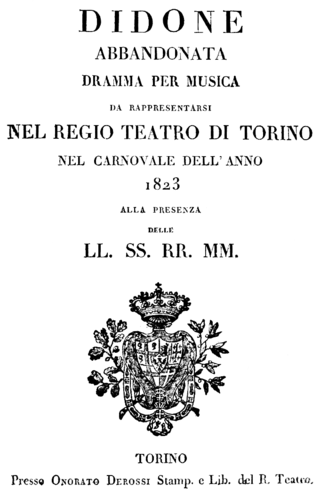
Pietro Antonio Domenico Trapassi, better known by his pseudonym of Pietro Metastasio, was an Italian poet and librettist, considered the most important writer of opera seria libretti.

Alessandro nelle Indie is an opera seria in two acts by Giovanni Pacini to a libretto by Andrea Leone Tottola and Giovanni Schmidt, based on Alessandro nell'Indie by Pietro Metastasio. It was premiered at the Teatro di San Carlo in Naples on 29 September 1824, and had a total of 38 performances in its first season.

Temistocle (Themistocles) is an opera seria in three acts by the German composer Johann Christian Bach. The Italian text is an extensive revision of the libretto by Metastasio first set by Antonio Caldara in 1736, by Mattia Verazi, court poet and private secretary to the Elector Palatine Carl Theodor. The opera was the first of two which J. C. Bach set for the Elector Palatine. Some of the music was reused from earlier works, including part of the overture from Carattaco.

Angelo Maria Amorevoli was a leading Italian tenor in Baroque opera.

Issé is an operatic pastorale héroïque by the French composer André Cardinal Destouches. Initially it was in three acts. The definitive revised version consists of a prologue and five acts. The libretto was by Antoine Houdar de la Motte. Although Destouches was only 25 at the time of its premiere, it is considered his best score.

Didone abbandonata was an opera in three acts composed by Tomaso Albinoni. Albinoni's music was set to Pietro Metastasio's libretto, Didone abbandonata, which was in turn based on the story of Dido and Aeneas from the fourth book of Virgil's Aeneid. The opera premiered on 26 December 1724 at the Teatro San Cassiano in Venice and was the first time that an opera based on a Metastasio libretto was performed in Venice.

Didone abbandonata is an opera in three acts composed by Domenico Sarro to a libretto by Pietro Metastasio of the same name which was based on the story of Dido and Aeneas from the fourth book of Virgil's Aeneid. The opera premiered on 1 February 1724 at the Teatro San Bartolomeo in Naples.

Annibale Pio Fabri, also known as Balino, from Annibalino, diminutive of his first name, was an Italian singer and composer of the 18th century. One of the leading tenors of his age in a time dominated by the castrati, Fabri is now best known for his association with the composer George Frideric Handel, in whose operas Fabri sang.

Carlo Scalzi was an Italian castrato who had an active performance career in major opera houses in Italy from 1718-1738. He was also heard in London in 1733–1734 where he notably created the role of Alceste in the world premiere of George Frideric Handel's Arianna in Creta. The librettist Pietro Metastasio described Scalzi as a "very unique singer" and likened his voice to that of the famous castrato Farinelli.

Siroe, or Siroe re di Persia, is an opera seria in three acts by Johann Adolph Hasse. The libretto was by Metastasio. As with many of the latter's libretti, Siroe was also set by Hasse's contemporaries, for example Vinci, Vivaldi and Handel.
Fedra is an opera in two acts composed by Simon Mayr to an Italian-language libretto by Luigi Romanelli based on Racine's play Phèdre.
Il trionfo di Clelia, Wq. 31, is an opera composed by Christoph Willibald Gluck. It takes the form of a dramma per musica in three acts. The Italian-language libretto by Pietro Metastasio is based on several semi-legendary narratives concerning the founding of the Roman Republic. The opera premiered on 14 May 1763 at the Teatro Comunale di Bologna. Although rarely performed since then, it was revived in London in 2012 at the Royal Opera House's Linbury Studio.

Domenico Giacinto Fontana (1692–1739), also known as "Farfallino", was an Italian castrato singer active primarily in Rome from 1712 to 1736. He specialised in singing soprano female roles and earned the name "Farfallino" for his graceful stage appearance. He was born in Perugia and died there at the age of 47. At times he feared ridicule by performing certain roles, such as a pregnant primadonna.

Semiramide riconosciuta is a dramma per musica in two acts by Giacomo Meyerbeer. It is the composer's fifth opera and the second that he composed for a theatre in Italy. The text is an adaptation of a pre-existing libretto by Pietro Metastasio that had already been set to music by numerous other composers. The opera had its premiere at the Teatro Regio in Turin on 3 February 1819.
Semiramide riconosciuta is an opera libretto by Pietro Metastasio (1698–1782), written in 1729. It is for opera seria, and accordingly consists of recitatives and da capo arias. It tells a story of the legendary Semiramis, wife of the Biblical Nimrod.

Solimano is an opera in three acts composed by Johann Adolph Hasse to an Italian-language libretto by Giovanni Ambrogio Migliavacca. Loosely based on an episode in the life of Suleiman the Magnificent, the opera premiered on 5 February 1753 at the Opernhaus am Zwinger in Dresden. The lavish premiere production was designed by Giuseppe Galli Bibiena and featured Angelo Amorevoli in the title role.
Mattia Verazi was an Italian librettist primarily active at the court of Charles Theodore in Mannheim. He became known as the leader of a group of librettists who challenged the conventions of opera seria in the mid-18th century and was a long-time collaborator of composer Niccolò Jommelli. He also produced the libretti for Salieri's Europa riconosciuta, Sacchini's Calliroe, and J. C. Bach's Temistocle

Didone abbandonata is an 1823 opera in two acts by Saverio Mercadante to a libretto by Andrea Leone Tottola after Metastasio's Didone abbandonata. It was first performed on 18 January 1823 at the Teatro Regio in Turin.













